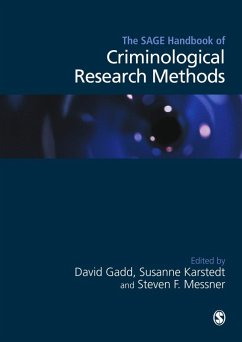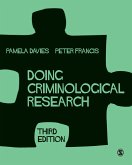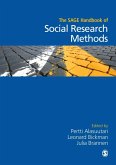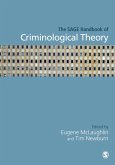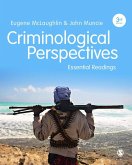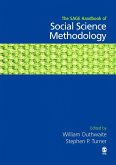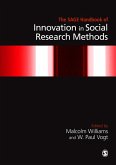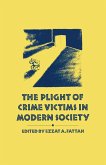Conducting research into crime and criminal justice carries unique challenges. This Handbook focuses on the application of 'methods' to address the core substantive questions that currently motivate contemporary criminological research. It maps a canon of methods that are more elaborated than in most other fields of social science, and the intellectual terrain of research problems with which criminologists are routinely confronted.
Drawing on exemplary studies, chapters in each section illustrate the techniques (qualitative and quantitative) that are commonly applied in empirical studies, as well as the logic of criminological enquiry. Organized into five sections, each prefaced by an editorial introduction, the Handbook covers:
. Crime and Criminals
. Contextualizing Crimes in Space and Time: Networks, Communities and Culture
. Perceptual Dimensions of Crime
. Criminal Justice Systems: Organizations and Institutions
. Preventing Crime and Improving Justice
Edited by leaders in the field of criminological research, and with contributions from internationally renowned experts, The SAGE Handbook of Criminological Research Methods is set to become the definitive resource for postgraduates, researchers and academics in criminology, criminal justice, policing, law, and sociology.
David Gadd is Professor of Criminology at Manchester University School of Law where he is also Director of the Centre for Criminology and Criminal Justice.
Susanne Karstedt has a Chair in Criminology and Criminological Justice at the University of Leeds.
Steven F. Messner is Distinguished Teaching Professor of Sociology, University at Albany, State University of New York.
Drawing on exemplary studies, chapters in each section illustrate the techniques (qualitative and quantitative) that are commonly applied in empirical studies, as well as the logic of criminological enquiry. Organized into five sections, each prefaced by an editorial introduction, the Handbook covers:
. Crime and Criminals
. Contextualizing Crimes in Space and Time: Networks, Communities and Culture
. Perceptual Dimensions of Crime
. Criminal Justice Systems: Organizations and Institutions
. Preventing Crime and Improving Justice
Edited by leaders in the field of criminological research, and with contributions from internationally renowned experts, The SAGE Handbook of Criminological Research Methods is set to become the definitive resource for postgraduates, researchers and academics in criminology, criminal justice, policing, law, and sociology.
David Gadd is Professor of Criminology at Manchester University School of Law where he is also Director of the Centre for Criminology and Criminal Justice.
Susanne Karstedt has a Chair in Criminology and Criminological Justice at the University of Leeds.
Steven F. Messner is Distinguished Teaching Professor of Sociology, University at Albany, State University of New York.
Dieser Download kann aus rechtlichen Gründen nur mit Rechnungsadresse in A, D ausgeliefert werden.
This remarkable collection of essays is criminological methodology like it ought to be. Reflecting the rich, methodological and substantive diversity of the field and the complexity of the criminological subject matter, these essays reveal the stories behind the stories criminologists tell. Essential reading for students and researchers alike
Professor Shadd Maruna
Queens University, Belfast
The Sage Handbook of Criminological Research Methods by David Gadd, Susanne Karstedt and Steven Messner brings together a large group of experienced researchers from across the world to write about a wide range of innovative and important approaches to criminological enquiry. But the handbook is much more than a standard "research methods" book in two significant ways: first, it situates each research methods within its theoretical home. Second, the authors have succeeded in striking the right balance between presenting a necessary textbook approach to using a research method and providing an experienced researcher's perspective on the ins and outs of actually conducting research. The practical insights provided throughout the book, across a very broad range of criminological inquiry, make for an engaging read
Professor Lorraine Mazerolle
University of Queensland, Australia
Criminology is characterized by a bewildering array of research methods ranging from randomized control experiments to ethnographies. The editors boldly charge into this intellectual thicket and provide some much needed organization and clarity. The 33 substantive chapters, written by some of the most respected criminologists in the field, provide an excellent resource for researchers and will make a welcome addition for both undergraduate and graduate research methods courses
Gary LaFree
Director, START Center and Professor of Criminology and Criminal Justice, University of Maryland
Professor Shadd Maruna
Queens University, Belfast
The Sage Handbook of Criminological Research Methods by David Gadd, Susanne Karstedt and Steven Messner brings together a large group of experienced researchers from across the world to write about a wide range of innovative and important approaches to criminological enquiry. But the handbook is much more than a standard "research methods" book in two significant ways: first, it situates each research methods within its theoretical home. Second, the authors have succeeded in striking the right balance between presenting a necessary textbook approach to using a research method and providing an experienced researcher's perspective on the ins and outs of actually conducting research. The practical insights provided throughout the book, across a very broad range of criminological inquiry, make for an engaging read
Professor Lorraine Mazerolle
University of Queensland, Australia
Criminology is characterized by a bewildering array of research methods ranging from randomized control experiments to ethnographies. The editors boldly charge into this intellectual thicket and provide some much needed organization and clarity. The 33 substantive chapters, written by some of the most respected criminologists in the field, provide an excellent resource for researchers and will make a welcome addition for both undergraduate and graduate research methods courses
Gary LaFree
Director, START Center and Professor of Criminology and Criminal Justice, University of Maryland

